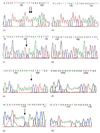APC mutations in sporadic colorectal tumors: A mutational "hotspot" and interdependence of the "two hits"
- PMID: 10737795
- PMCID: PMC16243
- DOI: 10.1073/pnas.97.7.3352
APC mutations in sporadic colorectal tumors: A mutational "hotspot" and interdependence of the "two hits"
Abstract
Although APC mutations occur at a high frequency in colorectal cancers, few studies have performed a comprehensive analysis by screening the whole gene for mutations and assessing allelic loss. APC seems to act as a tumor-suppressor gene in a "nonclassical" fashion: data from familial adenomatous polyposis (FAP) show that the site of the germ-line mutation determines the type of "second hit" in FAP tumors, and simple protein inactivation is selected weakly, if at all. In this study, we screened the entire coding region of APC for mutations and assessed allelic loss in a set of 41 colorectal cancer cell lines. Of 41 cancers, 32 (83%) showed evidence of APC mutation and/or allelic loss. We identified several APC mutations and found a "hotspot" for somatic mutation in sporadic colorectal tumors at codon 1,554. Our results suggest that APC mutations occur in the great majority of colorectal cancers, the exceptions almost all being RER+ tumors, which may substitute for altered APC function by mutations in beta-catenin and/or at other loci. When combined with previously published data, our results show that there is interdependence of the "two hits" at APC in sporadic colorectal tumors as well as in FAP. APC mutations in the "mutation cluster region," especially those close to codon 1,300, are associated with allelic loss, whereas tumors with mutations outside this region tend to harbor truncating mutations. The causes of this phenomenon are probably selection for retained N-terminal and lost C-terminal APC functions, effects on beta-catenin levels, and APC protein stability.
Figures

References
-
- Kinzler K, Vogelstein B. Cell. 1997;87:159–170. - PubMed
-
- Miyoshi Y, Nagase H, Ando H, Horii A, Ichii S, Nakatsuru S, Aoki T, Miki Y, Mori T, Nakamura Y. Hum Mol Genet. 1992;1:229–233. - PubMed
-
- Miyaki M, Tanaka K, Kikuchi-Yanoshita R, Muraoka M, Konishi M. Crit Rev Oncol Hematol. 1995;19:1–31. - PubMed
-
- Miyaki M, Konishsi M, Kikuchi-Yanoshita R, Enomoto M, Igari T, Tanaka K, Muraoka M, Takahashi H, Amada Y, Fukayama M, et al. Cancer Res. 1994;54:3011–3020. - PubMed
-
- Bodmer W F, Bailey C J, Bodmer J, Bussey H J, Ellis A, Gorman P, Lucibello F C, Murday V A, Rider S H, Scambler P, et al. Nature (London) 1987;328:614–616. - PubMed
Publication types
MeSH terms
Substances
LinkOut - more resources
Full Text Sources
Other Literature Sources
Medical
Research Materials
Miscellaneous

